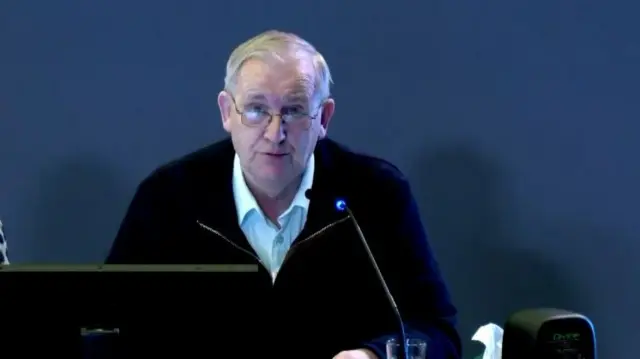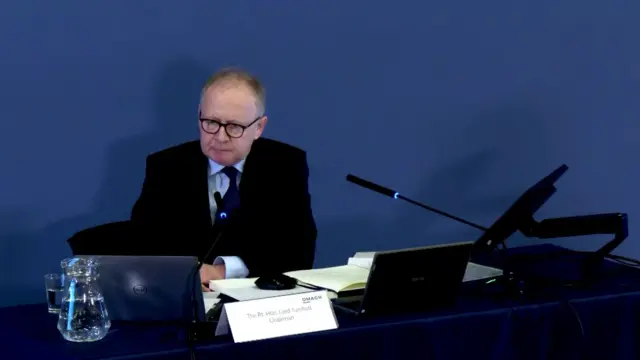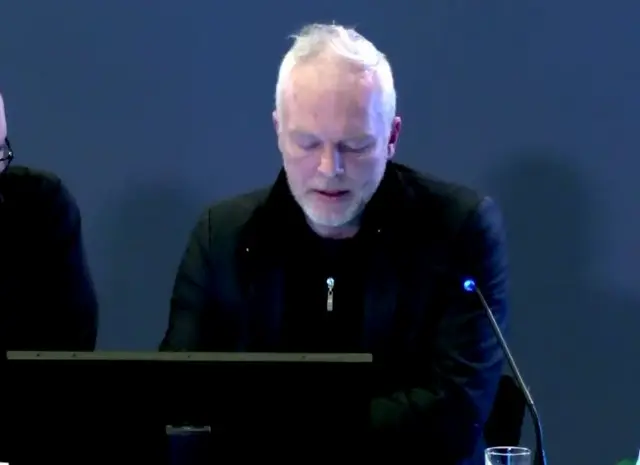Postpublished at 11:33 GMT 13 February
The inquiry is taking a short break.
The inquiry has this week moved into a new phase and is hearing from witnesses and people injured in the attack
On Thursday, the inquiry heard from David McSwiggan, Jim Sharkey, Suzanne Travis and Margaret Murphy, along with statements from Lisa McGonigle and Nichola Donnelly
The inquiry is examining whether the worst atrocity of the Troubles could have been prevented
Twenty-nine people, including a woman expecting twins, were murdered in the Real IRA attack on 15 August 1998
Relatives have had the opportunity to speak or provide statements in memory of those who died
Edited by Hayley Halpin. Warning: This page contains distressing details
The inquiry is taking a short break.
Lord Turnbull says Mr Sharkey's evidence has given a "further level" of understanding on the events that took place on 15 August 1998.
As well as this, he notes of how it has had an "enduring" effect on the people and businesses of Omagh.
Mr Sharkey says he was referred to The Bridge Centre to treat his psychological injuries, to "clear those unwanted images".
He says he doesn't go into town centre late on a Saturday afternoon, as it brings back so many memories.
He adds that Omagh became "quiet", it wasn't the same.
Mr Sharkey says after giving up the newsagent because of the effects the bomb had, the days were long and he went into a dark place in his mind.
"But we were lucky we survived," he says.
He says he keeps thinking if Sean, Elizabeth, Geraldine and Ann had stayed where they were, "would they have been safe".
Mr Sharkey hopes that the inquiry will provide answers.
Mr Sharkey recalls being diagnosed with tinnitus as a result of the bomb in the days that followed.
He says that having the back door in the shop open “saved” their lives that day.
Mr Sharkey recalls attending funerals in the weeks and months that followed.
His landlord had called him “crying” after initial hearing that Mr Sharkey had died in the bomb.
After things had settled down, Mr Sharkey recalls it being time to “give up the newsagents".
Mr Sharkey says when he was taken to the hospital it was like a "warzone". He says he was treated for his cuts and had put a sling on.
The next morning, he said it "hit" him when he heard about the fatalities, and thought about the people he met who might have been safe if they just stayed outside his shop.
"I get nightmares thinking about being so close to that bomb site," he says.
Mr Sharkey recalls a young boy standing a the drinks fridges with “shrapnel hardly missing him.”
“The world stood still for 30 or 40 seconds.”
He recollects the noises of screaming and alarms ringing, “filling his ears”.
While getting up to attend to one woman, he realised he had a “sore shoulder” due to the force of the bomb. He later discovered there was glass in his arm.
He says that while in a daze, Kevin from the nearby drapers store attended to him with a first aid kit. Sitting at a bench in “a state of shock”, he recalls shouting at his oldest son, who was unable to hear him.
He recalls heading back to the shop where all he could see were “bodies lying everywhere".
 Image source, Omagh Bombing Inquiry
Image source, Omagh Bombing InquiryThe inquiry is now hearing from Jim Sharkey, who ran the news agents on Market Street, having lived his whole life in Omagh.
Mr Sharkey says on the afternoon on 15 August 1998 he went to lunch when he heard of the bomb scare at the courthouse.
After he left the bar he met three girls, Geraldine Breslin, Ann McCombe and another girl.
When he went back to work he spoke to the newsagents at the courthouse, after this Sean McGrath a regular customer came in for his paper.
He says Elizabeth Rush came in from the shop next door looking for some change, she invited Sean next door for a coffee.
He adds him and his wife continued to serve customers for about the next 5-10 minutes, chatting about the bomb scare.
He says he saw Robert Watson come down the street towards him, and asked about the bomb scare and to keep the cash box safe.
"The next I knew the front window just came in around us," he says.
The inquiry hearing is now taking a short break.
 Image source, Omagh Bombing Inquiry
Image source, Omagh Bombing InquiryLord Turnbull says Mr McSwiggan provided the inquiry with an "insightful" and "articulate" account, including the "lasting" effects on his life.
He says he gave the inquiry a "powerful" account of the consequences of being exposed to the Omagh bombing.
Lord Turnbull adds it was helpful to learn from his negative experiences such as counselling, and the path leading to psychotherapy, which the inquiry wishes to give further thought to.
Mr McSwiggan says he only learned to control panic attacks through breathing exercises but he still has night terrors.
He says he had no "tolerance" for life and he became characterised by "emotional outbursts".
He adds that life often felt "frenzied", and it as "difficult" to make long term goals as his brain was working on survival.
All of these emotions became heightened once he became a father, Mr McSwiggan says.
He adds that the bombing "destroyed" his relationship with his then-partner, made his work life exhausting and made it impossible to become a practising visual artist.
Mr McSwiggan says he found it hard to attend therapy, where he says he just told them what they wanted to hear.
He says anxiety, depression and coping mechanisms was robbing him of growth.
When he lost his relationship, job and degree he sought help, where he had "to fight" to get access to proper long term mental health care.
He adds that he experienced "a quarter of a century of rupture".
Mr McSwiggan hopes he “hasn’t began his healing journey too late” for the sake of his sons.
He hopes that by sharing his testimony alongside others, there will be “a renewed abhorrence for all violence, be it committed by state or non-state actors” and it will lead to a “greater understanding of those affected by “trauma” in terms of “long term effects” – “earlier diagnosis, intervention and better long term care".
Mr McSwiggan is recalling going to university in Coventry “far from anybody who had been affected by the bomb", six weeks later.
He says his year in England was a year of “loneliness, humiliation, depression and anxiety".
He says over the past two decades, that “living away from home” became his “normalised expectation of the world".
Later training as an English teacher and living abroad, Mr McSwiggan moved to Belfast in 2009.
Upon returning, he recalls having “no real adult life to refer to".
He says the “idea” that you could be in your local town with “everyone rounded up and killed in front of you", left him feeling that he “never rationalised that".
Referring to becoming a father in 2011, he says it was always “easy to see how to worst could happen in any given situation".
He recalls “adapting maladaptive coping mechanisms”, engaged in “risk-taking behaviours” in order to “suppress the flashbacks and insomnia".
On the street he saw a woman distributing water bottles and he was among a group who got them.
He says his hearing was beginning to return and he heard someone say there might be another bomb at the courthouse.
Mr McSwiggan says panic set in and he found himself running for shelter along with the others.
Once things calmed down, he used the phone to call his family home, where his mother was, he says at that moment he "selfishly" wanted was the comfort only a mother could provide.
Mr McSwiggan says it was strange to see people who had not realised what had happened.
The following day he attended hospital and was treated for a sprained ankle, perforated eardrums, superficial shrapnel cuts and minor burns.
His father returned from the hospital to tell him his friends were alive but Pauline was severely burned.
 Image source, Omagh Bombing Inquiry
Image source, Omagh Bombing InquiryMr McSwiggan notes feeling “selfish” that he wanted to find “his friends alive".
He says he “he couldn’t cope” and “felt terrible” not helping the injured but having a focus on finding his friends.
Mr McSwiggan says the emergency services appeared and started to put injured people onto transport to take them to hospital.
Mr McSwiggan returned to find his friends, while he tried not to see and "be overwhelmed by the horrific devastation".
He remembers what his friends were wearing so he tried to look for them while blocking out the "carnage", but the images stay in his mind to this day.
He says he repeatedly went in and out of the scene of the explosion until he couldn't take any more.
Once he emerged further up Market Street, where the street was almost deserted.
When he arrived outside the tourist office he realised he had to contact his family, including his mother who worked at the theatre in the hospital.
David McSwiggan says the next thing he remembers is climbing out of whatever he landed in while heat and smoke filled the air.
He says the street was filled with "trapped people everywhere, buildings collapsing onto the street".
He adds there was a large hole in the road and people inside it, including people with severe injuries.
He says his ears were ringing.
As he made his way to the middle of the junction, he says it felt like everyone behind him were dead or had severe injuries.
He says in fear he looked down to see his hands were still intact.
Mr McSwiggan said that he and his friends were moved “down Market Street".
“Among a crowd of hundreds of people waiting to be giving the all clear to return to their place of work," he says.
Standing in a small circle with his friends David and Pauline, he recalls being “sceptical” about the bomb scare being real.
“Our wee town, as much as the back water that it was, did not merit to be a target now, especially as The Troubles were meant to be over.”
He explains that “suddenly an immense force” brought “bricks tumbling, disintegrating around us".
“A dark dusty, smokey blackness, just seemed to envelop everything."
He recalls “losing all sense of gravity” with “objects, large and small, moving with force”.
“I think I was being blown backwards off my feet through the air,” he, says recalling landing in a “trailer or car windscreen”.
The inquiry is hearing first from David McSwiggan, a survivor of the Omagh bombing.
The attack happened one week after his 20th birthday, he was due to start a degree in England in September.
David McSwiggan says he met up with his friends in Omagh on the day of the Real IRA attack.
As they hung out at the junction of High Street and Market Street a police car arrived and officers began to tell people on the High Street that there was a bomb scare at the courthouse.
He says it didn't feel "strange" as they usually "come to nothing".
Hello and welcome back to BBC News NI's live coverage of the Omagh Bombing Inquiry as the third week of hearings continues.
The public inquiry was set up by the government to examine whether the 1998 explosion could have been prevented by the UK authorities.
During the first two weeks of the inquiry, we heard commemorations of victims of the Omagh bombing.
On Tuesday, the inquiry moved into a new phase and is now hearing from witnesses and people who were injured in the Real IRA attack.
Today we are expected to hear from:
The inquiry is due to begin at 10:00 GMT.
That's our live coverage finished for the day. We'll start up again tomorrow morning when the inquiry resumes at 10:00 GMT. Join us then.
Today's live page was written by Stephen Greer and Holly Fleck, and edited by Hayley Halpin.
Thanks for joining us.
Today we heard from six survivors of the Real IRA attack, including: